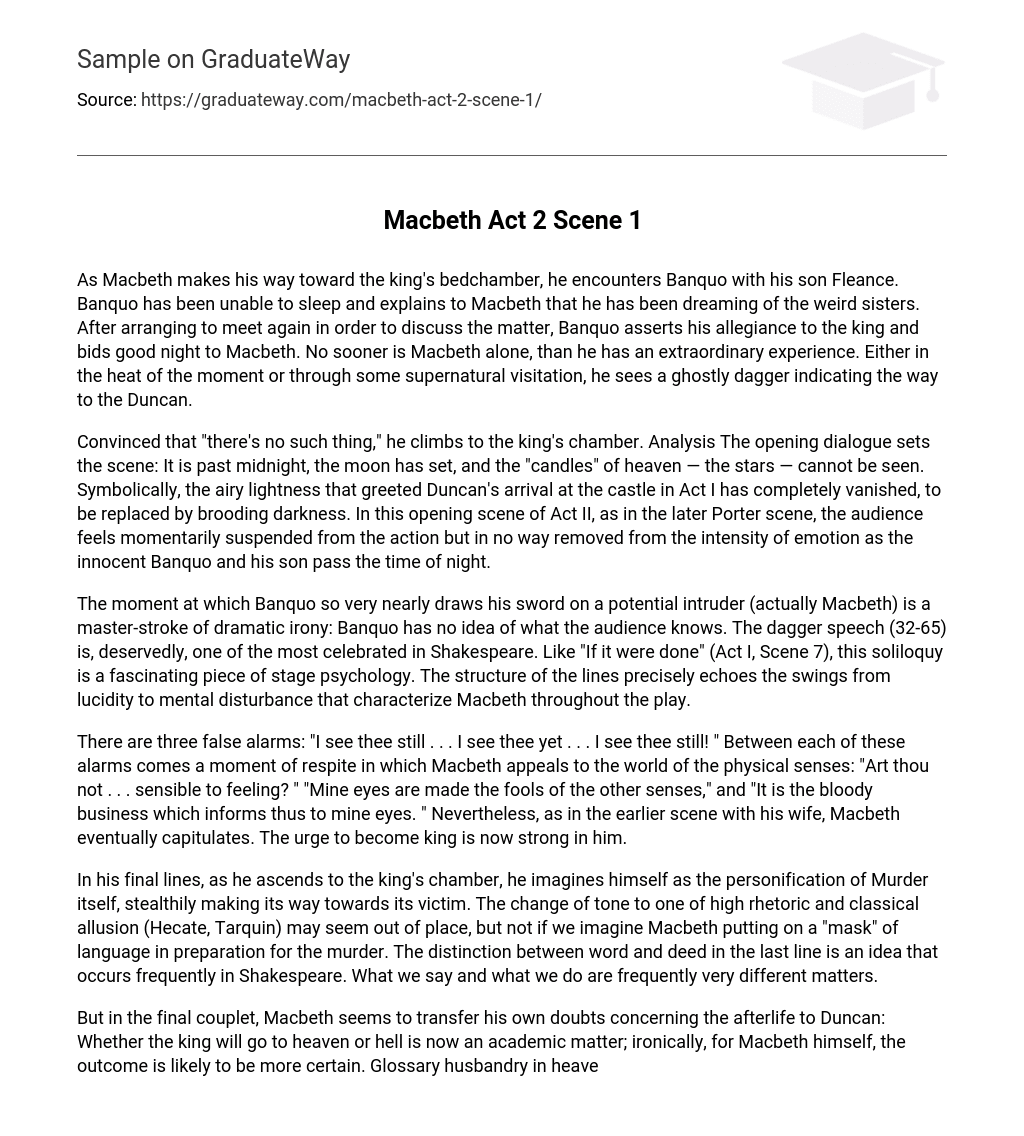As Macbeth makes his way toward the king’s bedchamber, he encounters Banquo with his son Fleance. Banquo has been unable to sleep and explains to Macbeth that he has been dreaming of the weird sisters. After arranging to meet again in order to discuss the matter, Banquo asserts his allegiance to the king and bids good night to Macbeth. No sooner is Macbeth alone, than he has an extraordinary experience. Either in the heat of the moment or through some supernatural visitation, he sees a ghostly dagger indicating the way to the Duncan.
Convinced that “there’s no such thing,” he climbs to the king’s chamber. Analysis The opening dialogue sets the scene: It is past midnight, the moon has set, and the “candles” of heaven — the stars — cannot be seen. Symbolically, the airy lightness that greeted Duncan’s arrival at the castle in Act I has completely vanished, to be replaced by brooding darkness. In this opening scene of Act II, as in the later Porter scene, the audience feels momentarily suspended from the action but in no way removed from the intensity of emotion as the innocent Banquo and his son pass the time of night.
The moment at which Banquo so very nearly draws his sword on a potential intruder (actually Macbeth) is a master-stroke of dramatic irony: Banquo has no idea of what the audience knows. The dagger speech (32-65) is, deservedly, one of the most celebrated in Shakespeare. Like “If it were done” (Act I, Scene 7), this soliloquy is a fascinating piece of stage psychology. The structure of the lines precisely echoes the swings from lucidity to mental disturbance that characterize Macbeth throughout the play.
There are three false alarms: “I see thee still . . . I see thee yet . . . I see thee still! ” Between each of these alarms comes a moment of respite in which Macbeth appeals to the world of the physical senses: “Art thou not . . . sensible to feeling? ” “Mine eyes are made the fools of the other senses,” and “It is the bloody business which informs thus to mine eyes. ” Nevertheless, as in the earlier scene with his wife, Macbeth eventually capitulates. The urge to become king is now strong in him.
In his final lines, as he ascends to the king’s chamber, he imagines himself as the personification of Murder itself, stealthily making its way towards its victim. The change of tone to one of high rhetoric and classical allusion (Hecate, Tarquin) may seem out of place, but not if we imagine Macbeth putting on a “mask” of language in preparation for the murder. The distinction between word and deed in the last line is an idea that occurs frequently in Shakespeare. What we say and what we do are frequently very different matters.
But in the final couplet, Macbeth seems to transfer his own doubts concerning the afterlife to Duncan: Whether the king will go to heaven or hell is now an academic matter; ironically, for Macbeth himself, the outcome is likely to be more certain. Glossary husbandry in heaven (4) the gods are economical with their starlight cleave to my consent (25) approve of my plan augment (27) support dudgeon (46) handle gouts (46) drops Hecate (52) goddess of witchcraft Tarquin (46) murderous king of Rome prate (58) prattle
In act II sc I in the play Macbeth the floating dagger represents Macbeth’s desire of killing Duncan. His mind is been working on the planning the murder for so long that even when Macbeth is awake he sees the dagger pointing to Duncan. Freud talks about this and he says that dreams are wish fulfillments and in this case, Macbeth was daydreaming about something he wants to do, but still cannot achieve. Freud says that every dream is a wish that needs to be fulfilled. Macbeth is having hallucinations about this desire because he knows it is wrong to kill Duncan.
Even though he is still thinking about it and it makes Macbeth’s mind picture a fulfillment for his desire to kill Duncan. Also the dagger could represent Macbeth’s penis. Freud explanations say that behind every dream there is a sexual issue and that the goal of every human is to procreate and extend their offspring. In the play, Macbeth wants to be the king and the dagger symbolizes Macbeth’s penis. This means that Macbeth wanted to be a king and he wanted his sons to be kings too; so him and his offspring could rule.
In conclusion the dagger means Macbeth’s desire to kill Duncan, he sees the blood and the dagger pointing at Duncan. The dagger also represents Macbeth’s desire to expand his offspring to be the king and leave behind his sons to rule for him. Freud says that the subconscious of Macbeth is coming out and it is telling him to make his desire and deepest dream come true. Macbeth hallucinates about this because he is about to murder Duncan and all this feelings are coming out. Macbeth might be feeling guilty about his thoughts and that is why he sees himself with the dagger and pointing to Duncan.





